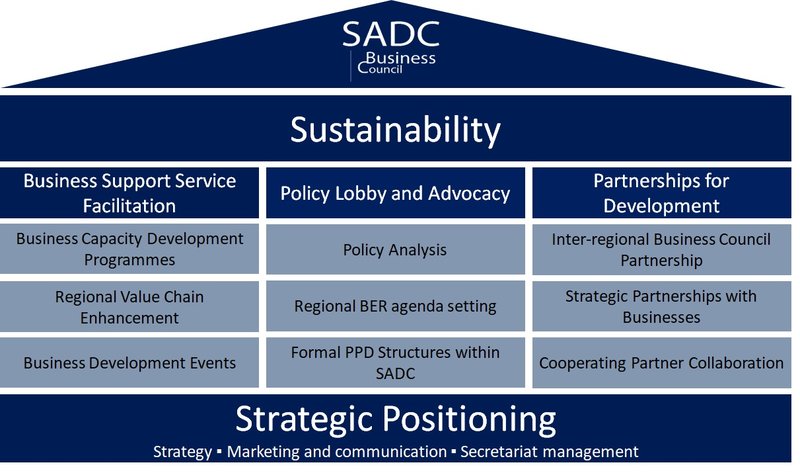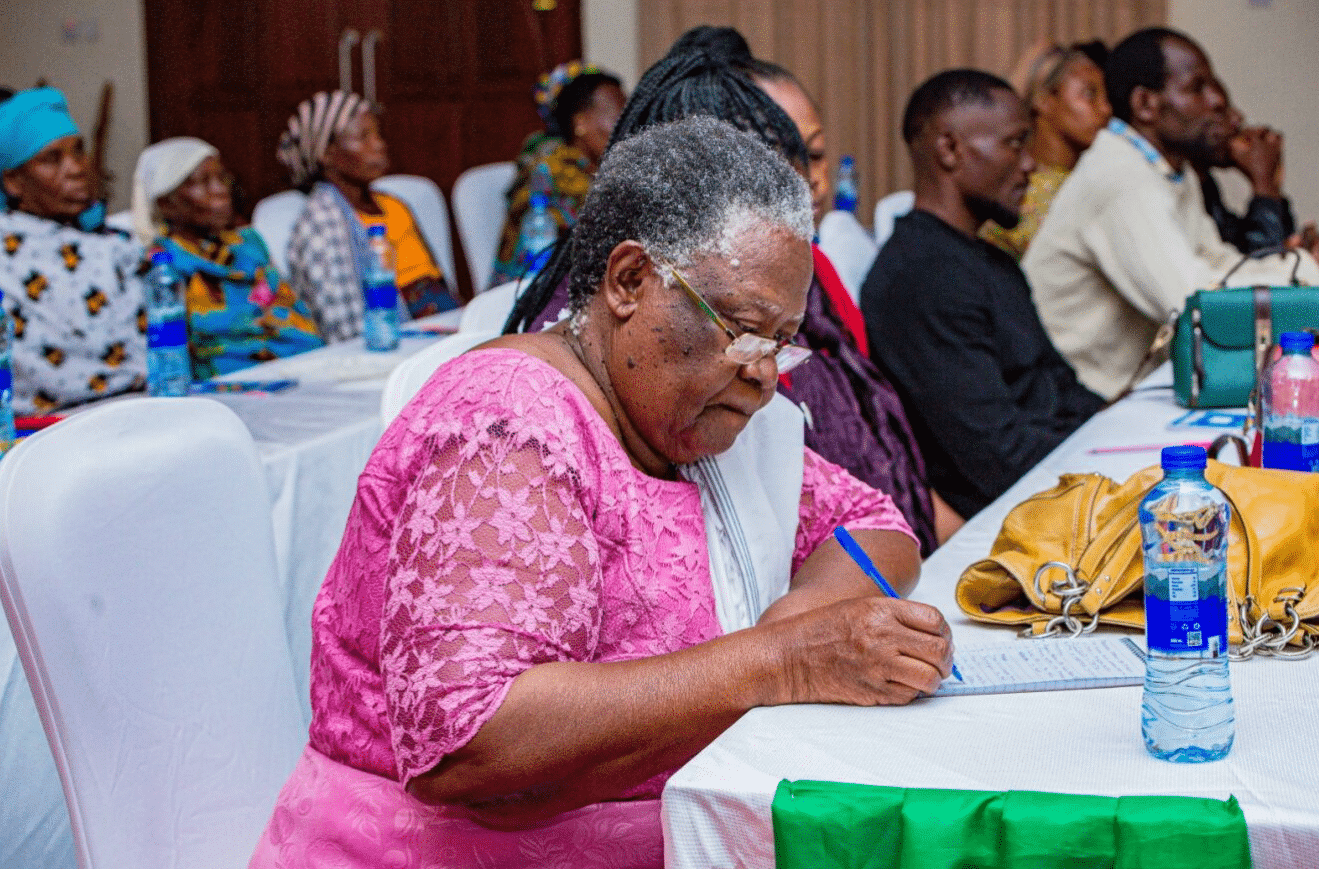The Southern African Development Community (SADC) is a Regional Economic Community comprising 16 member states (WWW.SADC.INT).
Established in 1992, SADC is committed to regional integration and poverty eradication within Southern Africa through economic development and ensuring peace and security. In 2019, SADC established a Business Council (SADC BC) with the following goal set out by the SADC Executive Secretary:
“The establishment of the SADC Business Council is commendable,” […and] “will establish a closer public-private sector cooperation in the technological and economic transformation of SADC economies, and thus push forward the SADC Industrialisation agenda.”
Dr. Stergomena Lawrence Tax, SADC Executive Secretary
One of the challenges of launching such an initiative is to ensure that it achieves its goal. This is even more relevant in the Covid-19 era, where the business outlook may not be as positive and where businesses more than ever need to benefit from initiatives such as SADC BC. It is also important to ensure that lessons learned from previous regional business arrangements to enhance trade and regional integration are taken on board and that the process takes advantage of this previous experience to ensure that improvements are made.
It is within this context that the SADC BC requested support from the ICR Facility to assist in a participatory development of a five-year strategy and action plan. The Strategy House (see picture) is one of the results of the intervention setting out the core strategy of the SADC BC.
SADC BC Strategy House

Strategic positioning requires a strong secretariat, board and governance system to realise anticipated impacts. Institutional strengthening will, therefore, form the foundation of the SADC BC’s strategy, and it will focus on expanding staff numbers and skills, finalizing the SADC BC constitution, and increasing the membership base.
Central to the SADC BC’s operations is the ‘policy lobbying and advocacy’ pillar. Under this pillar, working groups, such as the existing Pharmaceutical Group and recently activated Trade and Transport Group, will be used or created to compile common policy issues affecting stakeholders around priority value chains and topical issues to set agendas for policy reform. For instance, the SADC BC recently flagged Covid-19 related cross-border transport and logistics challenges in the region as a policy-reform agenda item. This is evident from SADC’s adoption of guidelines on the harmonisation and facilitation of cross-border transport operations during the pandemic that were influenced by the SADC BC’s policy analysis and resulting Economic Recovery Position Paper advising policy makers on business challenges and suggestions to stimulate post-Covid-19 trade. Formalizing the Public-Private Dialogue (PPD) structure through the SADC Secretariat – SADC BC Rules of Engagement is a major cornerstone.
For the ‘business support service facilitation’ pillar, and taking into account the needs expressed by the SADC business community, the SADC BC will for example develop a demand-driven business matching system using digital platforms. Digital trade strategies will complement conventional networking meetings based on the SADC BC’s commitment to promoting e-trade and the opportunities it presents for enhancing business competitiveness. Further, through regional value chain analyses, priority value chains and viable markets will be identified to facilitate market linkages, for example through online and face-to-face networking events (e.g. the Annual SADC Industrialisation Week).
In the ‘partnerships for development’ pillar, agreements will be signed with other regional and international business councils, multinational businesses and corporations, and sector specific entities. Additionally, areas of mutual interest will be defined and developed into concepts for collaboration. Apart from facilitating business growth, the partnerships will contribute financial and technical resources (e.g. negotiation, research, strategic planning skills) to support the SADC BC’s activities. Besides forming new partnership, in the immediate, the BC will build on existing partnerships between SADC and other parties, including the European Union.[1]
Lastly, sustainability is a key cross-cutting area for the SADC BC. The SADC BC aims to be inclusive in all its activities. This will entail involving Micro, Small and Medium Enterprises (MSME’s), Entrepreneurs Living with Disabilities (ELWD), Women Enterprises and Youth Enterprises in its work. SADC BC will develop partnerships with regional bodies that support these groups and the relationships will be used to understand their needs in the business space. Participation of these groups will be encouraged at national and regional levels as a matter of policy. Further, the SADC BC will promote environmentally friendly practices among its members and partners. Finally, the SADC BC aims to achieve high levels of financial sustainability through the implementation of its new strategy. With the backdrop of increased visibility and provision of quality demand-driven services, it is anticipated that the membership base will grow, leading to increased interest and support from private sector and development partners.
Expected Impact of the SADC Business Council

Through the development and implementation of the five-year strategy, the SADC BC will deliver better representation through constructive and informed dialogue on business environment and investment climate issues. This is expected, in turn, to lead to an Improved Business Environment within the region evidenced by, in the long term, increased industrialization, increased exports from the region and reduced unemployment.
[1] One of the ICR Facility´s implementing partners, GIZ, is currently partnering with SADC BC via the project COOPERATION FOR THE ENHANCEMENT OF SADC REGIONAL ECONOMIC INTEGRATION, funded by the German Federal Ministry for Economic Cooperation and Development (BMZ) and the Austrian Development Agency (ADA).
ILO (2020). ILO Monitor: COVID-19 and the world of work, fourth edition. www.ilo.org/global/topics/coronavirus/impacts-and-responses/WCMS_745963/lang–en/index.htm.
SADC (2020). SADC regional response to COVID-19 pandemic. Gaborone. www.sadc.int/files/9115/8697/9635/SADC_regional_response_to_COVID-19.pdf
SADC (2019) Status of integration in the SADC Region Report. Gaborone. www.sadc.int/files/9915/9154/2991/Status_of_Integration_in_the_SADC_Region_Report.pdf
UNCTAD (2021). Impact of COVID-19 on trade and development. Geneva. unctad.org/system/files/official-document/osg2020d1_en.pdfWTO(2020).
WTO (2020). E-commerce, trade and the COVID-19 pandemic. https://www.wto.org/english/tratop_e/covid19_e/ecommerce_report_e.pdf
The ICR Facility supported the production of this publication. It is co-funded by the European Union (EU), the Organisation of African, Caribbean and Pacific States (OACPS) under the 11th European Development Fund (EDF), the German Federal Ministry for Economic Cooperation and Development (BMZ) and the British Council. The ICR Facility is implemented by GIZ, the British Council, Expertise France, and SNV. The contents of the publication are the sole responsibility of the authors and do not necessarily reflect the views of the EU, OACPS, BMZ or of the implementing partners.
